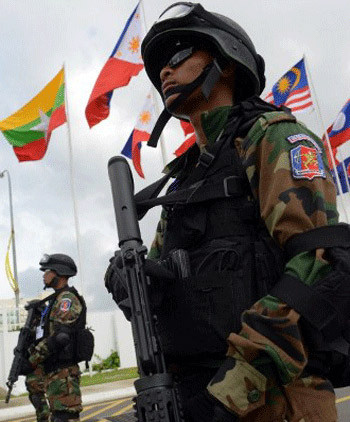South China Sea dispute heats up ASEAN conference
Territorial disputes in the South China Sea are expected to feature prominently in discussions between Southeast Asian countries and their partners at the ASEAN and Asia summits taking place these days.
On November 17, ASEAN foreign ministers met at the Peace Conference Center in Phnom Penh, protected by about 10,000 soldiers and police. This is the occasion when Cambodia welcomes the most VIP guests from the region and the world ever. In addition to the 10 ASEAN members, leaders of many powerful countries such as Russia, the US, China, India, Japan, and South Korea will also be present. Cambodian special forces, with machine guns on their shoulders and thick pads on their knees and shoulders, patrolled around the conference area, according toAP.

Vietnamese Prime Minister Nguyen Tan Dung at the ASEAN summit
After the opening summit today, there will be a meeting between ASEAN and its partners, followed by an expanded East Asia Summit, with the participation of US and Chinese leaders. Mr. Obama is the most notable guest at the conference, as Cambodia is his first appearance in the world after his re-election. China is represented by Premier Wen Jiabao. The Vietnamese delegation is led by Prime Minister Nguyen Tan Dung.
The summits, which mark ASEAN’s second major gathering of the year, are drawing close attention as observers wait to see whether the bloc can avoid a breakdown like that in July, when members of the 45-year-old association failed to sign a joint statement due to disagreements over how to address sovereignty disputes in the South China Sea.
ASEAN members Vietnam, the Philippines, Malaysia and Brunei have competing claims with China. Cambodia, which has close economic ties with China, did not accept the request of some members to include the dispute in the joint communique, and the parties left without agreeing on the final text, an unprecedented event in history.
Cambodia, the host and chair of the conference, will likely want to avoid serious disagreements like the one that occurred in July.
The claimants to the South China Sea believe that a multilateral approach to the issue will help break the deadlock and avoid further conflict, for the sake of stability and peace. China wants to resolve the dispute bilaterally with each party involved. The South China Sea issue has become heated over the past two years, with developments on the ground increasing, such as the number of collisions between ships of the countries, as well as heated statements. The United States, a Pacific nation, has signaled its special interest in this hot spot with Secretary Clinton’s statement that the United States has a national interest in ensuring maritime security and freedom of trade. The South China Sea is not only rich in oil and gas reserves and seafood, but is also a very important shipping route for world trade.

Cambodian soldiers stand guard to ensure security for the conference. Photo: AFP
ASEAN Secretary General Surin Pitsuwan said yesterday that territorial disputes in the South China Sea had been raised in general terms by some ministers, without mentioning details that could cause disagreement. At yesterday's foreign ministers' meeting, representatives of countries expressed the need to avoid conflicts - which Mr. Surin said were affecting the flow of foreign investment into the region due to safety concerns. They also talked about access to waters and energy security.
Sovereignty disputes in the East Sea have been assessed by international analysts as potentially becoming the world's next hot spot.
Mr Obama and several ASEAN leaders are expected to separately raise the need to ensure the dispute does not undermine the region and does not impede freedom of navigation in the South China Sea, where China claims large parts of it. Japanese Prime Minister Noda is also expected to raise the dispute between Tokyo and Beijing over the East China Sea.
According to the newspaperWall Street Journal, observers noted that ASEAN leaders seemed optimistic about the prospects for resolving the disputes, including discussing a code of conduct between parties in the East Sea, often referred to as COC, with China. However, speaking just a day before the foreign ministers' meeting took place, Ms. Fu Ying, China's vice foreign minister, stressed that Beijing expected the parties to focus on discussing economic cooperation, and not let the disputes overshadow the issues and prospects for development cooperation.
Another topic of interest during this series of conferences was the Association's unanimous adoption of a joint, non-legally binding, statement on the protection of human rights.
On Tuesday, the Asia-Pacific summit will take place with the participation of ASEAN and eight other countries, in a special political context in many major powers due to the remarkable leadership transition process: the US has just elected a president; China has just completed its ruling party congress, Japan and South Korea are about to hold elections.
According to Express-M
